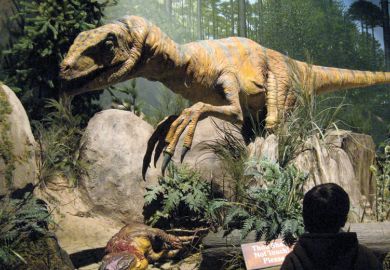They travelled through largely unknown areas, collecting plants and animals to share with Americans and the world. They mapped rivers, engaged with Native Americans and gave Americans a better understanding of the continent across which their country spreads. These field biologists of the past two centuries may have been intrepid explorers in the vein of Indiana Jones, but their work, as heralded in Michael J. Lannoo’s This Land Is Your Land , also had a far-reaching impact on their country and beyond, contributing to the rising science of ecology, wildlife biology, conservation biology and restoration biology. And, importantly, they produced preservation ideas that led to national parks, wildlife refuges, wilderness areas and laws protecting America’s natural resources.
Field biology, the study of “nature in nature”, is the central focus for Lannoo, an Indiana University professor who has trekked in polar and tropical regions and penned six prior books. His new one shines a light on this important work and on the people and institutions – including colleges, agencies and museums – that have long supported fieldwork and become repositories of their scientific riches. Starting with the Lewis and Clark expedition (1804-06) to explore western lands after the expansion of the United States following the Louisiana Purchase, Lannoo traces the pioneers in the field. “The task of these men was to find what was ‘out there’,” he writes, “or, in modern terminology, to assess biodiversity.” Theirs was the first of several expeditions into the new territory, with resulting collections of plants and animals that easterners eagerly embraced.
Lannoo’s strongest focus is on the next generation of field biologists who were “homegrown” – especially those born in the Midwest who rose to prominence through their work, including teaching at land-grant universities and staffing major American museums. He offers one short biography after another of different leaders in the field, building his case for their influence. He includes the stories of John Wesley Powell, explorer of the Grand Canyon and prophet who warned about the arid west, and William Temple Hornaday, a zoo curator-turned-conservationist who realised that bison herds were disappearing. Ecologists are also highlighted, as is the evolution of some into wildlife biologists, such as Aldo Leopold, whose work in restoration and writing about the need for a new land ethic influenced modern environmental thinking.
Unfortunately, women are largely missing from the book. Margaret “Mardy” Murie, recognised by many environmental groups for her activism in saving wilderness and for her fieldwork with her husband Olaus, gets little recognition; Olaus and his brother Adolph are instead highlighted at length. And while Lannoo mentions influential Western conservation writers such as Wallace Stegner, female writers such as Mary Hunter Austin, a Midwesterner transplanted to the desert south west, certainly also voiced the need to protect this wondrous landscape.
The work of these field biologists set the groundwork for “America’s best idea”: the national park system that expanded into various forms of federal preservation, including grasslands, wilderness areas and laws such as the Endangered Species Act of 1973 that have been adopted by other countries. Such biologists’ legacies may previously have been overlooked, but they have made our world a better place.
Leslie Kemp Poole is assistant professor of environmental studies at Rollins College in Winter Park, Florida.
This Land Is Your Land: The Story of Field Biology in America
By Michael J. Lannoo
University of Chicago Press
304pp, £67.50 and £22.50
ISBN 9780226358475 and 9780226580890
Published 10 September 2018
POSTSCRIPT:
Print headline: Exploring in the name of science
Register to continue
Why register?
- Registration is free and only takes a moment
- Once registered, you can read 3 articles a month
- Sign up for our newsletter
Subscribe
Or subscribe for unlimited access to:
- Unlimited access to news, views, insights & reviews
- Digital editions
- Digital access to THE’s university and college rankings analysis
Already registered or a current subscriber?







